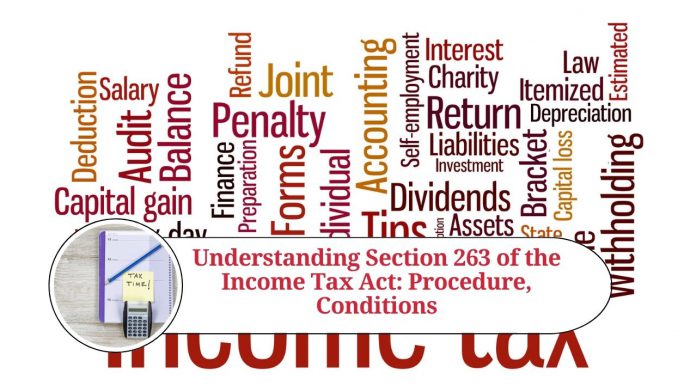Section 263 of the Income Tax Act is a provision that empowers the Commissioner of Income Tax to revise any order passed by an assessing officer if the Commissioner believes that the order is erroneous and prejudicial to the interests of the revenue. The objective of this provision is to ensure that the interests of the revenue are protected, and tax evasion is prevented.
Conditions for invoking Section 263
There are certain conditions that need to be met before the Commissioner can invoke Section 263. The Commissioner can invoke this provision if the order passed by the assessing officer is erroneous, i.e., it is not in accordance with law, and it is prejudicial to the interests of the revenue, i.e., it results in a loss of revenue to the government. The Commissioner can also invoke Section 263 if the assessing officer has not made a proper enquiry, has not applied the correct law, has not taken into consideration relevant facts, has made an assessment that is too low, has not collected taxes, has allowed excessive deductions or exemptions.
Procedure for invoking Section 263
The Commissioner can initiate proceedings under Section 263 by issuing a notice to the assessee, stating the reasons for invoking this provision. The assessee is given an opportunity to explain their position and present their case before the Commissioner. The Commissioner will consider the explanation provided by the assessee and will examine the records before passing an order.
Order passed by the Commissioner
Once the Commissioner is satisfied that the order passed by the assessing officer is erroneous and prejudicial to the interests of the revenue, he may pass an order revising the same. The Commissioner may also direct the assessing officer to make a fresh assessment in accordance with law, after taking into consideration all the relevant facts.
Appeal against the order passed by the Commissioner
The order passed by the Commissioner under Section 263 is subject to appeal before the appellate authority. The assessee can file an appeal against the order passed by the Commissioner within the prescribed time limit. The appellate authority will consider the facts and evidence presented by both parties before passing an order.
Conclusion
Section 263 of the Income Tax Act is a powerful provision that allows the Commissioner of Income Tax to revise an order passed by an assessing officer if the same is considered erroneous and prejudicial to the interests of the revenue. This provision ensures that the interests of the revenue are protected, and tax evasion is prevented. The provision also gives an opportunity to the assessee to present their case before the Commissioner, and the order passed by the Commissioner is subject to appeal before the appellate authority
Read more useful content:
- section 234e of income tax act
- section 286 of income tax act
- section 90a of income tax act
- section 40a(7) of income tax act
- section 226(3) of income tax act
- section 24 of income tax act
Frequently asked questions (FAQs) about Section 263 of the Income Tax Act:
Q: What is Section 263 of the Income Tax Act?
A: Section 263 of the Income Tax Act is a provision that empowers the Commissioner of Income Tax to revise any order passed by an assessing officer if the Commissioner believes that the order is erroneous and prejudicial to the interests of the revenue.
Q: What is the objective of Section 263 of the Income Tax Act?
A: The objective of Section 263 of the Income Tax Act is to ensure that the interests of the revenue are protected, and tax evasion is prevented.
Q: Under what circumstances can the Commissioner invoke Section 263?
A: The Commissioner can invoke Section 263 if the order passed by the assessing officer is erroneous, i.e., it is not in accordance with law, and it is prejudicial to the interests of the revenue, i.e., it results in a loss of revenue to the government. The Commissioner can also invoke Section 263 if the assessing officer has not made a proper enquiry, has not applied the correct law, has not taken into consideration relevant facts, has made an assessment that is too low, has not collected taxes, has allowed excessive deductions or exemptions.
Q: What is the procedure for invoking Section 263?
A: The Commissioner can initiate proceedings under Section 263 by issuing a notice to the assessee, stating the reasons for invoking this provision. The assessee is given an opportunity to explain their position and present their case before the Commissioner. The Commissioner will consider the explanation provided by the assessee and will examine the records before passing an order.
Q: What happens after the order is passed by the Commissioner under Section 263?
A: Once the Commissioner is satisfied that the order passed by the assessing officer is erroneous and prejudicial to the interests of the revenue, he may pass an order revising the same. The Commissioner may also direct the assessing officer to make a fresh assessment in accordance with law, after taking into consideration all the relevant facts.
Q: Can an assessee appeal against the order passed by the Commissioner under Section 263?
A: Yes, the order passed by the Commissioner under Section 263 is subject to appeal before the appellate authority. The assessee can file an appeal against the order passed by the Commissioner within the prescribed time limit. The appellate authority will consider the facts and evidence presented by both parties before passing an order.




















